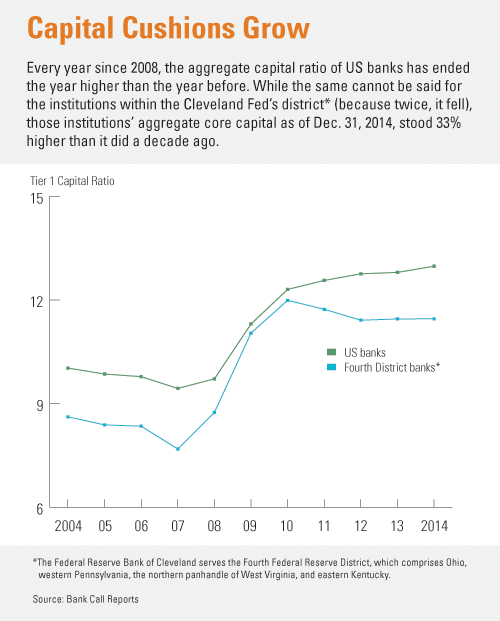- Share
Stressed, Then Assessed
The Federal Reserve finds no objection, again, with the capital adequacy and capital plans of the 4 largest bank holding companies in the Cleveland Fed’s District.
The results of the 2015 CCAR stress tests of the largest US bank holding companies are in, and for the third consecutive year, the Federal Reserve did not object to the capital plans of the 4 firms included in the exercise in the Cleveland Fed's district.
Announced this month, the results of the Comprehensive Capital Analysis and Review (CCAR) are made public so all stakeholders "have a sense of the resiliency of these firms," that is, the firms' ability to maintain sufficient capital to continue operations through times of economic and financial stress, explains Jenni Frazer, an assistant vice president with the Cleveland Fed. In its fifth year, CCAR involves institutions with more than $50 billion in total assets.
Cleveland-based KeyCorp, Cincinnati-based Fifth Third Bancorp, Columbus-based Huntington Bancshares, Inc., and Pittsburgh-based PNC Financial Services Group, Inc. were among 28 companies to receive no objection.
In addition to the 28 non-objections, the Federal Reserve issued a conditional non-objection for one firm (Bank of America Corporation) and objected to the plans of 2 firms (Deutsche Bank Trust Corporation and Santander Holdings USA) on qualitative grounds, or because of weaknesses related to each firm's capital planning processes.
After the Federal Reserve objects to a capital plan, the affected firms may not make any capital distribution unless expressly permitted by the Fed.
"One of the things we found during the most recent financial crisis is lending dried up, and it was a time when the economy needed lenders to provide loans to credit-worthy borrowers," explains Mike Coldwell, also an assistant vice president with the Federal Reserve Bank of Cleveland. "The CCAR program aims to assess whether firms have capital to weather the storm and to continue lending."

Through CCAR, the Federal Reserve assesses firms' internal capital planning processes and resiliency under different adverse economic scenarios, both quantitatively and qualitatively. Quantitatively, the focus is on a firm's projected capital ratios under a hypothetical scenario of severe economic and financial market stress.
Qualitatively, the Fed's eyes are on a firm's capital planning processes, for example, its risk identification and risk management practices.
"Companies are doing a better job connecting risks identified in their business activities to capital planning processes and potential capital needs," Frazer says. "It's important for firms to have sound foundational risk management processes in order to estimate capital needs in various scenarios."
Companies this year zeroed in on hypothetical risks concerning lending, plus specific industries and portfolios, Coldwell notes. Of particular interest was the potential impact to bank portfolios of the recent downturn in oil and gas prices.
Repurchases on the horizon
The Federal Reserve Bank of Cleveland serves the Fourth Federal Reserve District; there are 12 Districts altogether. The District comprises Ohio, western Pennsylvania, the northern panhandle of West Virginia, and eastern Kentucky.
All 4 of the CCAR-tested companies in the District (Key, Fifth Third, Huntington, and PNC) disclosed plans to increase the dividends they pay shareholders and to repurchase shares. When a bank repurchases its own shares, it reduces the number of shares held by investors, a situation which means earnings per share increase if profits remain steady.
Such repurchase activity is up, in part because merger and acquisition activity among firms of the CCAR size is diminished significantly, the Cleveland Fed's Coldwell says. Coupled with increased competition for lending, firms aren't able to deploy capital in the same ways they might have prior to 2008.
It is ultimately the responsibility of a bank holding company's board of directors to approve capital actions such as dividends and share repurchases that have not been objected to by the Fed.


